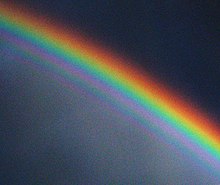User:Solipsist

| Name: | Solipsist |
| Location: | Cambridge, United Kingdom |
| Age: | Middle |
| Gender: | Male |
| On wikipedia since: | March 2004 |
| Interests: | Editor of the gaps and illustrating articles. |
| Also available at: | commons:User:Solipsist |
I previously had a list of subject areas in which I might have some knowledge, but I've noticed that although I have a science/engineering/computing background I haven't actually edited many articles in the technical domain. This is largely because those areas are already well served by many other Wikipedians. Instead I've ended up finding gaps in coverage and writing articles to fill them. Typically this seems to be in the areas of art, architecture, and biography. Quite often, if I've found a good free image that needs a home, I might end up writing a short article to give it somewhere to go. At the tail end, I might be tempted to expand or rewrite an article that I happen on using the Random Page link.
Declaration of POV
- I'm an rationalist, but sometimes find religions interesting
- I'm a skeptic and oppose pseudoscience.
- I'm a liberal, but somewhat jaded towards politics
- I'm a mild deletionist
- I'll add other biases as I think of them
Everyone has his/her own biases, and in general it is as well to be aware of them in yourself, so you can balance them out.
To an extent, I use writing Wikipedia articles as an aid to researching and learning about new things. At the moment this covers articles on 20C British artists and architecture. I'm no expert, but these are areas that I've been casually studying over the last 5 – 6 years.
Wikipedia doesn't work anymore
[edit]It used to be said that Wikipedia worked because, although it was vandalised all the time, that vandalism was quickly reverted. This no long seems to be true, or at least there are no longer enough good editors to balance out the bad editors. I expect that Wikipedia is still growing, but many existing articles are slowly deteriorating. I'll track some examples here as I come across them.
It rather looks like user Jytdog was inserting their own bias, and using misleading edit summaries to hide it, in this edit from 2012 https://en.wikipedia.org/w/index.php?title=Mandatory_labelling&diff=516549075&oldid=515476694 No one has ever corrected it, even though this edit introduced a simple grammatical error - the paragraph should start 'The development _of_ genetically modified food'. If you check the page history, you can also find anon users adding references that are probably spam links to their book. Overall a thoroughly neglected article.
As of Feb 2007, the article fails to mention the discoveror of MSG, Professor Kikunae Ikeda, and also fails to mention its connection to one of the biggest US food scares of all time, Chinese Restaurant Syndrome. Both facts have been in the article a year ago, but have been missing for ages.
In Feb 2007, someone decided to remove one of two lead images on the Palace of Westminster article saying that they were both rather similar. Now the Palace of Westminster article is a featured article, so you would think were some good editors watching it. Also apart from being taken at night/dusk the two photos weren't that similar, but in anycase they chose to remove the much higher quality image that was a featured picture. No one noticed, no one complained, no one reverted. The same day, the second picture got deleted for being an SXC sourced image with insufficient checks on license status, then a third editor moved another lower quality image up to fill the hole at the top of the article. Did anyone check to see whether the article was in better shape in the past? .... no. Well, not until I happened to read the article yesterday and let Diliff know that his FP had disappeared from the article. -- Solipsist 09:20, 22 April 2007 (UTC)
Misguided or nonsense editing by Monir32 on 6 October 2007 left in place for a good 6 months now, although several editors have added a number of Wiki housekeeping tags. Not a particularly mainstream article, but clearly nobody has any interest in maintaining it. -- Solipsist (talk) 19:11, 27 April 2008 (UTC)
This distance to the moon added by TechnoFaye on 2nd April 2008 appears to be wrong. Or at the very least, insufficiently defined as to which measure for the distance to the moon is intended. A more commonly accepted figure is between 384,399 kilometers and 384,403 kilometers for the mean distance between the centre of the Earth and the centre of the Moon. -- Solipsist (talk) 09:39, 5 August 2008 (UTC)
The first paragraph of the Early Life section of the current version of the article, fails to clearly mention who Ted Bundy's mother was. It reads as if some sentences are missing. Sure enough, a version from two years ago does identify his mother as Eleanor Louise Cowell, was a young department store clerk. Both versions seem a little confused about what the mystery concerning Bundy's father was - I think the suggestion is that Bundy's mother was being abused by her father and became pregnant.
There have been a couple of thousand edits between these two version with rewrites and vandalism affecting many of the sentences in this section. The date, the town and the mention of Elizabeth Lund Home come and go, but for over two years nobody appears to have noticed that the first mention of Bundy's mother had been deleted. -- Solipsist (talk) 14:18, 26 August 2008 (UTC)
The article's lead section was deleted by an anon on 22 Feb 2009. A month later its not been reverted and several more edits have occurred since. -- Solipsist (talk) 09:32, 19 March 2009 (UTC)
- Eventually got fixed in June 2009 in this edit. But Bullzeye appears to have written a new lead section themselves [1]. I guess they didn't notice that there used to be a perfectly good lead section 4 months earlier, and anyone who contributed to that earlier text was wasting their time. -- Solipsist (talk) 11:41, 23 October 2009 (UTC)
A glaring omission in the English Channel article is that it fails to mention the impact of the last ice age. Of crucial significance to the flora and fauna of Britain, was the land bridge that joined Britain to Europe as the ice retreated at the end of the last ice age.
I had to go back to a version from two years ago before I found the section on formation that had been deleted. -- Solipsist (talk) 09:18, 23 October 2009 (UTC)
- Not so bad - got fixed in this edit about a day after I raised it on the article's talk page, although no further comment made on the talk page itself. -- Solipsist (talk) 15:45, 31 October 2009 (UTC)
Only a paragraph this time. I was going to correct the ill-formatted link to the Office of Government Commerce that was added by an anon recently, when I began to wonder why the sentence about the connection to Prince2 was relevant at all (it probably isn't). On checking the history, I noticed that the article lost a different, perfectly good paragraph last November in an edit by another anon. It looks like this is another article that is going backwards. -- Solipsist (talk) 19:33, 7 January 2010 (UTC)
Incorrect example added by an anon and 'see also' section removed [2] Namdnop whilst attempting to add another incorrect example (possibly to promote their book). Edits are less than a month old, so possibly too early to say these are examples of failures to revert -- Solipsist (talk) 06:25, 31 March 2010 (UTC)
-- Possible additional problem articles whitelighter
Digital photography
[edit]
Indirectly, this photograph of a supernumerary rainbow is what prompted me to switch to digital photography last year. Many years ago, when I was in college, I had been fairly enthusiastic about photography and had a small SLR kit. I took some pretty good pictures, but the SLR was heavy to carry around, so I only took photographs when I was taking the time to go out and take photographs.
Some five years ago I picked up a compact camera, a μ-zoom. It was convenient to carry around and good for travelling, but really it was rubbish. It just didn't have the control to get exposures right and the the APS format is just too small. Pretty much every photograph I took with it was washed out and showed excessive grain. Those compact APS cameras were really just designed to take point-'n'-shoot pictures of friends and family, and that was about all they could manage.
Now being technologically minded, I had been tempted to get a digital camera for many years. The flip side being that I was also familiar with being suckered in to being an early adopter more times than I would care to confess. I was pretty convinced all the early 640x480 pixel cameras would be obsolete before you could open the box. And sure enough compact digital cameras have been racing along the technological curve as fast as anything. But last year I noticed that reviews were saying that the transition from 5 Mpixel cameras to 6 Mpixels wasn't helping the image quality much, largely because they were reaching the limits that compact lens optics could achieve.
However, what finally prompted me to buy a digital camera was seeing a supernumerary rainbow last year. Sometime around 1999, I read Greenler's Rainbows, Halos and Glories (ISBN 0521388651) and shortly after saw a double rainbow with an additional set of arcs inside the main bow. Having read Greenler I knew that tripple rainbows were theoretically impossible (although I hadn't read carefully enough to understand supernumerary bows). I was on a client's site at the time, so I didn't have a camera to hand, but afterwards, what really annoyed me was that I hadn't behaved as a good scientist and made written notes of details such as the order of colours in the third bow so that I might have a chance of understanding what I'd seen.
Then last year I saw another supernumerary rainbow. I was at home; I had time to grab the μ-zoom, but I had no film. I might have just had time to go and find the SLR, but that wouldn't have had film either. At least that time, I made written notes, and thanks to help from other Wikipedians was able to work out that it was a supernumerary bow. Of course, if I had had a digital camera, film wouldn't have been a problem.
So I bought a Canon S60 compact digital camera and it turned out to be a surprisingly good choice. Most especially because it zooms out to a wide angle view that is wider than average for a compact camera, which turns out to be quite important for architectural views. It is small enough that I carry it with me more often than not. It is capable of taking well detailed, high definition pictures and has sufficient manual control to cope with most difficult lighting conditions whilst also allowing creative exposure options. Its main limitations are a lack of a real telephoto zoom range and some significant difficulty in focusing acurately for closup semi-macro shots.
Then today I was working at home when I noticed the sun break through whilst it was still raining. Figuring that a rainbow was likely, I went outside with the Canon and an umbrella and was delighted to find it was another supernumerary rainbow — not nearly as strong as the previous two I had seen, but good enough to get some pictures. The photos have needed some pretty extreme contrast adjustment to make the additional arcs more visible (they were clearer to the naked eye), but at least they show the phenomenon. Chalk one up for digital photography.
I now suspect that supernumerary rainbows are not quite as rare as generally claimed, but rather that the additional arcs are usually rather faint and indistinct. Nevertheless, if you know to look out for them, you might see them more often.
Barnyard
[edit] |
 |
 |
 |
 |
